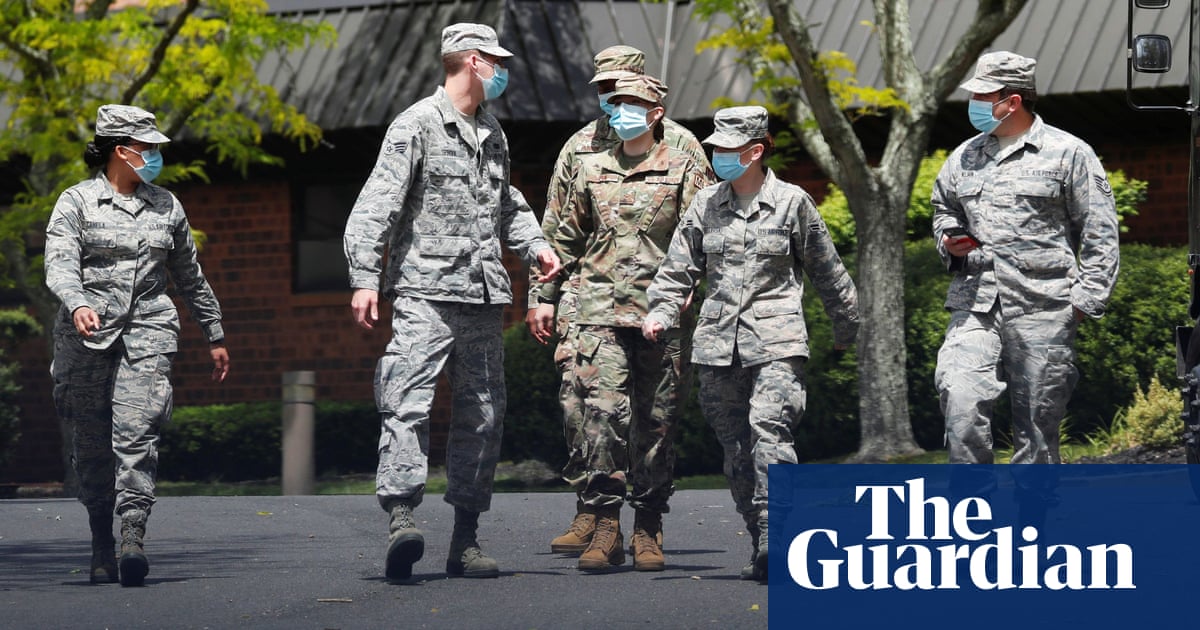
Just after midnight on Monday 1 June David McAtee was working at his barbecue restaurant in Louisville, Kentucky, when he was shot and killed by the national guard, who had been assisting police during the city’s dusk-to-dawn curfew. According to a video analysis by the New York Times, the fatal outcome was the result of “questionable policing tactics”, and the following day, the governor announced that he was withdrawing some of the troops from the city.
On 23 June, those service members will be back in Louisville under a very different mandate: serving as poll workers for the presidential primary.
Even under the best of circumstances, poll workers are in short supply. In 2016, 65% of jurisdictions nationwide reported it was “somewhat” or “very” difficult to fully staff their poll sites. Now, with 56% of poll workers over 60 years old, many are refusing to come to work out of fear of Covid-19. And not without reason: 71 people who went to the polls in Madison, Wisconsin, reported contracting the virus.
In response, the national guard has assisted or plans to assist election workers in Kentucky, Wisconsin, Nebraska and Indiana, raising concerns, especially in communities of color, about law enforcement mixing with the democratic process – a historically fraught relationship.
In Jonesboro, Georgia, a majority-black community, civil rights advocates fought to move a polling site away from a police department last year, citing the potential for voter intimidation.
“Many black voters are well aware of the role law enforcement officers played in suppressing the black vote in the south – particularly in the time leading up to the enactment of the Voting Rights Act of 1965,” said Julie Houk, an attorney with the Lawyers’ Committee for Civil Rights Under Law.
The potential for voter intimidation is especially high this year, especially for black voters, who, according to a recent publication by the Center for American Progress and the NAACP, are more likely to vote in person and the group least likely to vote by mail.
In 2018, a nearly 40-year-old consent decree expired, which had banned the Republican National Committee from engaging in “ballot security” activities, such as hiring off-duty police to patrol majority-minority precincts while wearing “National Ballot Security Task Force” armbands. In response, the RNC now plans to hire 50,000 volunteers in 15 states in order to combat “voter fraud” by challenging ballots and voters deemed suspicious.
Even jurisdictions that have expanded their mail-in voting in the face of the pandemic need as many, if not more, poll workers, which is the case in Jefferson county, which includes Louisville, where both McAtee and Breonna Taylor were killed by law enforcement. “We’ve added 180 employees just to fill and send out ballots,” said Nore Ghibaudy, the spokesperson for the board of elections.
Though Jefferson is being sued to open more poll sites, it currently plans to have just one for its 611,000 voters, instead of the usual 500 precincts, which is where the national guard will help sanitize equipment, promote social distancing guidelines and enforce the requirement that voters wear masks inside. According to Ghibaudy, they won’t be allowed to touch ballots, though he doesn’t know if they will serve in uniform.
Regardless, even considering McAtee’s death, Ghibaudy doesn’t believe that some voters could see the national guard as intimidating, especially since there will be other law enforcement present. Under Kentucky state law, every county election board must have the county sheriff as part of its four-member board of elections. Trey Grayson, the former secretary of state for Kentucky, said he had never heard complaints about the role of law enforcement in election administration.
But considering the recent killings of McAtee and Taylor, others are more wary. “Due to recent events, we fear having national guard members at Louisville’s single voting location could lead to voter intimidation,” said Amber Duke, the communications director for the ACLU of Kentucky. “If there is no viable alternative to activating guard members, state officials should inform the public in advance about how they should expect to encounter the guard if they choose to vote in person.”
More than likely, election officials might not implement another alternative in time. Consider Milwaukee’s predicament for the presidential primary on 7 April. Typically, the city staffs between 2,000 and 2,200 poll workers, but only 350 had committed to working, and only half ultimately showed up. Because the Wisconsin governor had made the national guard available, the city of Milwaukee election commission requested about 200 service members. Still, the city was able to open just five of 180 poll sites.
“We could not have managed in-person voting had we not had that infusion of guard members,” said Neil Albrecht, the commission’s executive director.
For the April primary, Cambridge, a Wisconsin town of 1,500, only had four of its typical 20 poll workers. Then, the national guard came and contacted all 75 voters with outstanding absentees, 45 of which were then returned. “If we hadn’t had that extra help, we wouldn’t have made those phone calls,” said Lisa Moen, elections administrator.
While the national guard probably enfranchised voters in these cities, their relationship to communities of color has been more scrutinized since early April. In Minneapolis, they were filmed reportedly firing riot control rounds at people on their porch. In Atlanta, they allegedly helped police shoot teargas at protesters. In Washington DC, they attempted to disperse protesters by flying their helicopters at low altitude.
But the national guard is not the only corps of workers that could fill the gaps. Montgomery county, Maryland, recruits sixth through 12th graders through its Future Vote program, and during the state’s primary, some were on site to assist at the polls. Montgomery had no shortage of poll workers, and because the program’s director makes sure to recruit from all corners of the county’s diverse community, 40% of the students are bilingual, and combined, they are able to translate for 45 languages.


